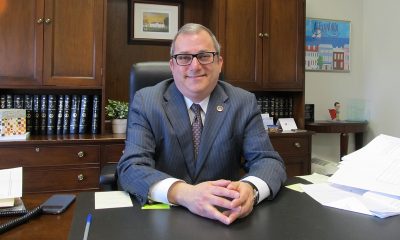District of Columbia
D.C. debates how to cope with crime as reform bill heads to Senate
House Democrats join GOP in voting to overturn measure
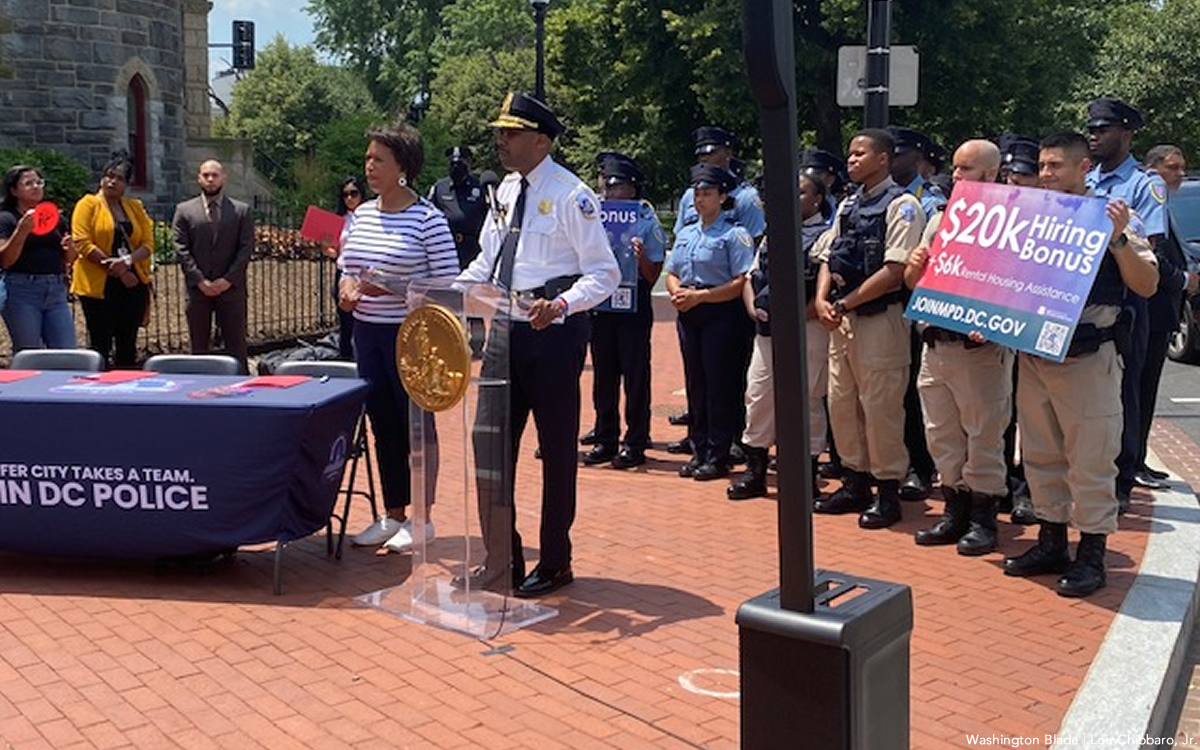
Just over three weeks after the D.C. Council overturned Mayor Muriel Bowser’s veto of a controversial criminal code reform bill that the Council had passed unanimously last November, the Republican-controlled U.S. House of Representatives on Feb. 9 voted 250 to 173 to overturn the D.C. bill.
In a development that surprised some D.C. political observers, including LGBTQ activists, 31 House Democrats were among those joining Republicans in voting to overturn the sweeping 450-page Revised Criminal Code Act of 2022.
On the same day that it voted to overturn the crime bill, the House voted 260 to 162, with 42 House Democrats voting yes, to pass a second disapproval resolution calling for overturning a bill approved by the D.C. Council to allow non-citizens to vote in local D.C. elections.
Both bills must now go to the U.S. Senate, where Democrats have a slim majority and where just a few Democratic senators voting to overturn either of the two bills, including the crime bill, could result in passage of the disapproval measure. It would then go to President Joe Biden, who would be faced with the choice of vetoing the measures or allowing one or both of the two D.C. bills to be overturned.
The president has said he opposes both of the two disapproval resolutions in the House, but he has not said whether he would veto the disapproval measures.
Most of those who have expressed concern over the criminal code reform bill, including Bowser, D.C. Police Chief Robert Contee, and the Office of the U.S. Attorney for D.C., have said they support 95 percent of the bill’s provisions.
Supporters, including D.C. Council Chair Phil Mendelson (D-At-Large), point out that the voluminous bill was methodically developed over the past 16 years by the nonpartisan D.C. Criminal Code Reform Commission to modernize the city’s criminal code that has not been significantly changed since 1901.
Mendelson and D.C. Council member Charles Allen (D-Ward 6), who headed the Council committee that drafted the legislation, strongly dispute claims that the bill would result in increased crime in the city or that it would hamper efforts by police to curtail crime.
The mayor has said her opposition centers around several of the bill’s provisions that, among other things, would eliminate most mandatory minimum prison sentences, reduce maximum sentences for crimes such as burglaries, carjackings, and robberies, and allow jury trials for all misdemeanor cases in which a prison sentence is possible.
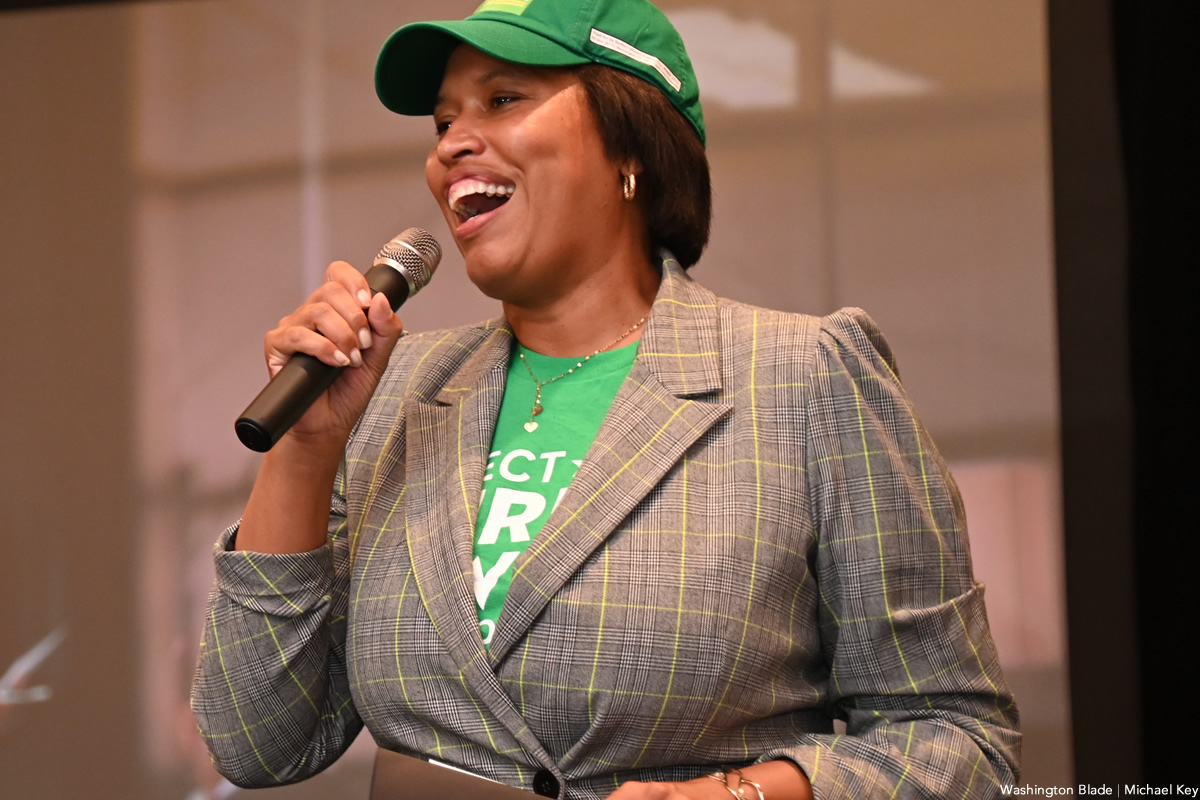
Critics say allowing a jury trial for most misdemeanor cases would overwhelm the D.C. Superior Court that they say already has too few judges to handle its criminal case load. Under the city’s 1971 Home Rule Act approved by Congress, the U.S. president appoints all D.C. court judges, and the U.S. Senate must confirm the appointments.
Supporters of the criminal code reform measure point out that it is currently drafted so it does not take effect until 2025, which they say will give the court system time to adapt to the new criminal code. But opponents, including the mayor, say that would not prevent the problems that they say the bill as currently written will bring about when it takes effect.
“This bill does not make us safer,” said Bowser in announcing her decision to veto the bill.
“While no one believes that penalties alone will solve crime and violence right now, we must be very intentional about messages that we are sending to our community, including prosecutors and judges,” the mayor said in a statement. “People, we know, are tired of violence and right now our focus must be on victims and preventing more people from becoming victims,” she said.
Bowser added that the bill would weaken what she said was an already lenient sentence for illegal gun possession by reducing the maximum sentence for carrying a pistol without a license and being a convicted felon in possession of a gun.
She has expressed strong opposition to Congress stepping in to overturn the bill, saying that it should be left up to the city to make any changes needed to improve the bill. Bowser last week submitted to the Council legislation calling for changes in the bill, including removing provisions in the current bill that would lower maximum penalties and allow jury trials for most misdemeanor cases.
Among the most outspoken critics of the criminal code revision bill has been the D.C. Police Union, whose chairperson, Gregg Pemberton, said the legislation would result in “violent crime rates exploding more than they already have.”
Most local LGBTQ organizations have not taken an official position on the bill. Capital Stonewall Democrats, the city’s largest local LGBTQ political group, has yet to take a position on the bill itself and most likely will not do so at this time, according to Monika Nemeth, the group’s recently elected president.
Nemeth said threats by Congress to overturn this and other D.C. bills are of great concern to the organization, and it reconfirms Capital Stonewall Democrats’ strong support for D.C. statehood.
Adam Savit, president of Log Cabin Republicans of D.C., the local chapter of the national LGBTQ Republican organization Log Cabin Republicans, said the local chapter also has not taken an official position on the D.C. criminal code bill. But he said in an email to the Blade that “we generally sympathize with the sentiments of the D.C. GOP,” which has come out against the legislation on grounds that it will result in a higher rate of crime in the city.
“Decreased penalties mean a decreased deterrent, and it will absolutely lead to increased criminality and further undermine the ability of the police to keep order,” Savit said in expressing his own opinion. “The way to protect LGBTQ citizens is to set credible penalties for violent crime and enforce the law,” he said.
The DC Center for the LGBT Community, which oversees its longstanding LGBTQ Anti-Violence Project, did not respond to a request by the Blade for comment on the crime bill.
The D.C. Gay and Lesbian Activists Alliance, however, has taken a position in strong support of the measure.
“We applaud the D.C. Council for enacting the Revised Criminal Code Act, an important modernization of our criminal laws that is the product of over 15 years of careful deliberation,” said GLAA President Tyrone Hanley in a statement to the Blade. Hanley said the statement was approved by the GLAA board.
“We have long known that mandatory minimums do not make communities safer, but exacerbate mass incarceration,” the GLAA statement says. “The larger symbolic reductions in maximum sentences for certain crimes bring them in-line with actual practice [by judges], plus research demonstrates that the length of sentence is not an effective deterrent to most crime,” the GLAA statement continues.
“We should not give in to right-wing narratives that some wish to use to exert power over D.C. and return to ineffective and harmful approaches,” the statement concludes.
Longtime D.C. gay activist and former GLAA President Rick Rosendall has taken a similar position, saying in an email to the Blade that opposition to the bill is based on “alarmist talking points.” Rosendall pointed to the assertion by D.C. Council member Kenyan McDuffie (I-At-Large) that some provisions in the bill actually raise penalties and create new categories of crimes that make it easier for prosecutors to prove.
Another longtime LGBTQ rights advocate and Democratic Party activist Peter Rosenstein has taken a differing view. He says he fully agrees with Bowser’s decision to veto the crime bill and said the Council should not have passed the separate bill to allow non-U.S. citizen D.C. residents the right to vote in local D.C. elections.
“Lowering the maximum possible penalties for burglaries, carjackings (now at their highest) and robberies, while residents are seeing a crime wave, is irresponsible and won’t make the city safer,” Rosenstein said in a Washington Blade commentary. “If Congress takes action on these bills, the Council must accept the full blame,” he said. “While Congress shouldn’t interfere with the D.C. government (I have long advocated for budget and legislative autonomy for the District) we don’t have it yet.”
D.C. Congressional Del. Eleanor Holmes Norton (D-D.C.) has strongly criticized the House for passing the disapproval resolutions calling for overturning the crime bill and the noncitizen voting rights bill. She said she is alarmed that Republican members of the House and Senate are once again attempting to intervene and usurp the will of the democratically elected D.C. local government.
Norton noted that since Congress passed the D.C. Home Rule Act of 1971, creating the city’s elected mayor and Council – with Congress retaining the ability to make the final decision on all laws passed by the D.C. government – Congress has only used its power to overturn a D.C. law on three occasions over the past 40 years.
One of the three laws overturned by Congress was the Sexual Assault Reform Act of 1981, which called for repealing the city’s antiquated sodomy law that made it a crime for consenting same-sex adults and consenting heterosexual adult to engage in oral or anal sodomy. It took another 12 years for the Council to pass legislation repealing the D.C. sodomy law in 1993. At that time gay then-U.S. Rep. Barney Frank (D-Mass.) played a lead role in persuading Congress not to overturn the sodomy repeal law once again.
But with states throughout the country now passing or considering anti-LGBTQ bills, including bills targeting transgender people and drag performances, the emboldened action by the U.S. House on Feb. 7 to overturn two bills passed by the D.C. Council raises the possibility that GOP lawmakers in Congress might attempt to impose anti-LGBTQ policies on the District.
Norton has pointed out that although Congress has so far overturned only three D.C. laws, it has also imposed restrictions on the city through its power to control the city’s budget and spending. Without needing approval by the Senate, the GOP-controlled House has in the past — and can at this time — add hostile provisions to the city’s annual budget bill.
In recent years, the House has used the budget process to ban D.C. funding for abortions for women in financial need and to block the city from allowing the sale of marijuana as part of D.C.’s legislation – which Congress allowed the city to pass – decriminalizing the possession of marijuana.
Most LGBTQ activists contacted by the Blade said they haven’t had a chance to read the entire 450-page Revised Criminal Code Act, but from what they have learned about the bill from media reports leads them to believe it most likely would not impact LGBTQ people any more or less than the overall D.C. population.
Some activists, however, point out that transgender women of color have been targeted for crimes in the D.C. area, including murder, in greater numbers than others in the community. And the release by D.C. police in January of the city’s data on reported hate crimes in 2022 show that similar to the past 10 years or more, LGBTQ people were targeted for hate crimes in greater numbers than other categories of victims of hate crimes such as race, ethnicity, or religion.
“I’m not certain what contributes to the uptick in some types of calls that we’ve seen or some of the crimes that we’ve seen,” said D.C. Police Chief Robert Contee in response to a question from the Blade about what, if anything, police can do to address hate crimes targeting LGBTQ people.
“But our commitment is to investigate those cases thoroughly and hold people accountable when we identify people who are responsible for those types of crimes,” Contee said. “Our LGBT community is something special, not just to Washington, D.C. but to the Metropolitan Police Department,” he said. “They have a strong relationship with our Special Liaison Branch,” he noted, which oversees the department’s LGBT Liaison Unit.
“So, we’re going to continue to do the things we need to do to make sure that those calls are coming in and people are trusting us to report these crimes to us,” Contee told the Blade. “And again, we do everything we can to investigate those crimes.”
District of Columbia
Kennedy Center renaming triggers backlash
Artists who cancel shows threatened; calls for funding boycott grow

Efforts to rename the Kennedy Center to add President Trump’s name to the D.C. arts institution continue to spark backlash.
A new petition from Qommittee , a national network of drag artists and allies led by survivors of hate crimes, calls on Kennedy Center donors to suspend funding to the center until “artistic independence is restored, and to redirect support to banned or censored artists.”
“While Trump won’t back down, the donors who contribute nearly $100 million annually to the Kennedy Center can afford to take a stand,” the petition reads. “Money talks. When donors fund censorship, they don’t just harm one institution – they tell marginalized communities their stories don’t deserve to be told.”
The petition can be found here.
Meanwhile, a decision by several prominent musicians and jazz performers to cancel their shows at the recently renamed Trump-Kennedy Center in D.C. planned for Christmas Eve and New Year’s Eve has drawn the ire of the Center’s president, Richard Grenell.
Grenell, a gay supporter of President Donald Trump who served as U.S. ambassador to Germany during Trump’s first term as president, was named Kennedy Center president last year by its board of directors that had been appointed by Trump.
Last month the board voted to change the official name of the center from the John F. Kennedy Memorial Center For The Performing Arts to the Donald J. Trump And The John F. Kennedy Memorial Center For The Performing Arts. The revised name has been installed on the outside wall of the center’s building but is not official because any name change would require congressional action.
According to a report by the New York Times, Grenell informed jazz musician Chuck Redd, who cancelled a 2025 Christmas Eve concert that he has hosted at the Kennedy Center for nearly 20 years in response to the name change, that Grenell planned to arrange for the center to file a lawsuit against him for the cancellation.
“Your decision to withdraw at the last moment — explicitly in response to the Center’s recent renaming, which honors President Trump’s extraordinary efforts to save this national treasure — is classic intolerance and very costly to a non-profit arts institution,” the Times quoted Grenell as saying in a letter to Redd.
“This is your official notice that we will seek $1 million in damages from you for this political stunt,” the Times quoted Grenell’s letter as saying.
A spokesperson for the Trump-Kennedy Center did not immediately respond to an inquiry from the Washington Blade asking if the center still planned to file that lawsuit and whether it planned to file suits against some of the other musicians who recently cancelled their performances following the name change.
In a follow-up story published on Dec. 29, the New York Times reported that a prominent jazz ensemble and a New York dance company had canceled performances scheduled to take place on New Year’s Eve at the Kennedy Center.
The Times reported the jazz ensemble called The Cookers did not give a reason for the cancellation in a statement it released, but its drummer, Billy Hart, told the Times the center’s name change “evidently” played a role in the decision to cancel the performance.
Grenell released a statement on Dec. 29 calling these and other performers who cancelled their shows “far left political activists” who he said had been booked by the Kennedy Center’s previous leadership.
“Boycotting the arts to show you support the arts is a form of derangement syndrome,” the Times quoted him as saying in his statement.
District of Columbia
New interim D.C. police chief played lead role in security for WorldPride
Capital Pride says Jeffery Carroll had ‘good working relationship’ with organizers
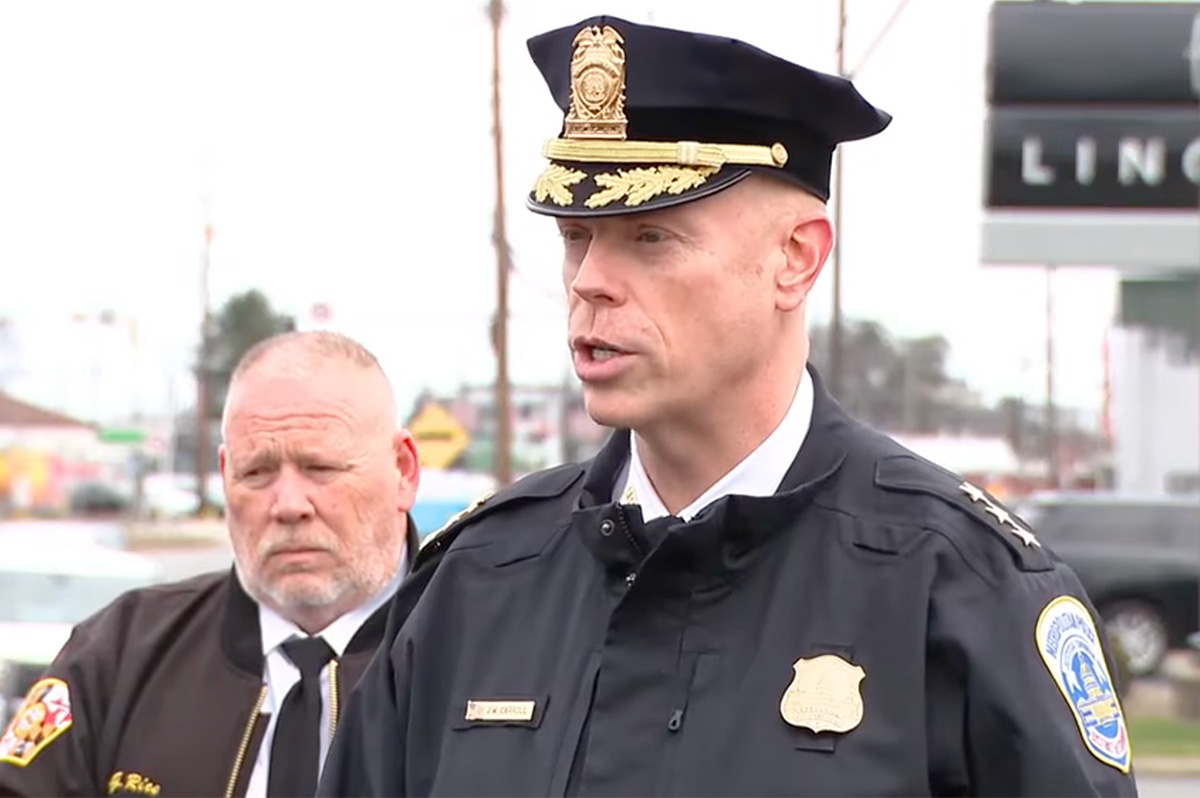
Jeffery Carroll, who was named by D.C. Mayor Muriel Bowser on Dec. 17 as the city’s Interim Chief of Police, played a lead role in working with local LGBTQ community leaders in addressing public safety issues related to WorldPride 2025, which took place in D.C. last May and June
“We had a good working relationship with him, and he did his job in relation to how best the events would go around safety and security,” said Ryan Bos, executive director of Capital Pride Alliance.
Bos said Carroll has met with Capital Pride officials in past years to address security issues related to the city’s annual Capital Pride parade and festival and has been supportive of those events.
At the time Bowser named him Interim Chief, Carroll had been serving since 2023 as Executive Assistant Chief of Specialized Operations, overseeing the day-to-day operation of four of the department’s bureaus. He first joined the D.C. Metropolitan Police Department in 2002 and advanced to multiple leadership positions across various divisions and bureaus, according to a statement released by the mayor’s office.
“I know Chief Carroll is the right person to build on the momentum of the past two years so that we can continue driving down crime across the city,” Bowser said in a statement released on the day she announced his appointment as Interim Chief.
“He has led through some of our city’s most significant public safety challenges of the past decade, he is familiar with D.C. residents and well respected and trusted by members of the Metropolitan Police Department as well as our federal and regional public safety partners,” Bowser said.
“We have the best police department in the nation, and I am confident that Chief Carroll will meet this moment for the department and the city,” Bowser added.
But Bowser has so far declined to say if she plans to nominate Carroll to become the permanent police chief, which requires the approval of the D.C. City Council. Bowser, who announced she is not running for re-election, will remain in office as mayor until January 2027.
Carroll is replacing outgoing Chief Pamela Smith, who announced she was resigning after two years of service as chief to spend more time with her family. She has been credited with overseeing the department at a time when violent crime and homicides declined to an eight-year low.
She has also expressed support for the LGBTQ community and joined LGBTQ officers in marching in the WorldPride parade last year.
But Smith has also come under criticism by members of Congress, who have accused the department of manipulating crime data allegedly showing lower reported crime numbers than actually occurred. The allegations came from the Republican-controlled U.S. House Oversight Committee and the U.S. Justice Department
Bowser has questioned the accuracy of the allegations and said she has asked the city’s Inspector General to look into the allegations.
Meanwhile, a spokesperson for the D.C. police Office of Public Affairs did not immediately respond to a question from the Washington Blade about the status of the department’s LGBT Liaison Unit. Sources familiar with the department have said a decline in the number of officers currently working at the department, said to be at a 50-year low, has resulted in a decline in the number of officers assigned to all of the liaison units, including the LGBT unit.
Among other things, the LGBT Liaison Unit has played a role in helping to investigate hate crimes targeting the LGBTQ community. As of early Wednesday an MPD spokesperson did not respond to a question by the Blade asking how many officers are currently assigned to the LGBT Liaison Unit.
District of Columbia
Imperial Court of Washington drag group has ‘dissolved’
Board president cites declining support since pandemic
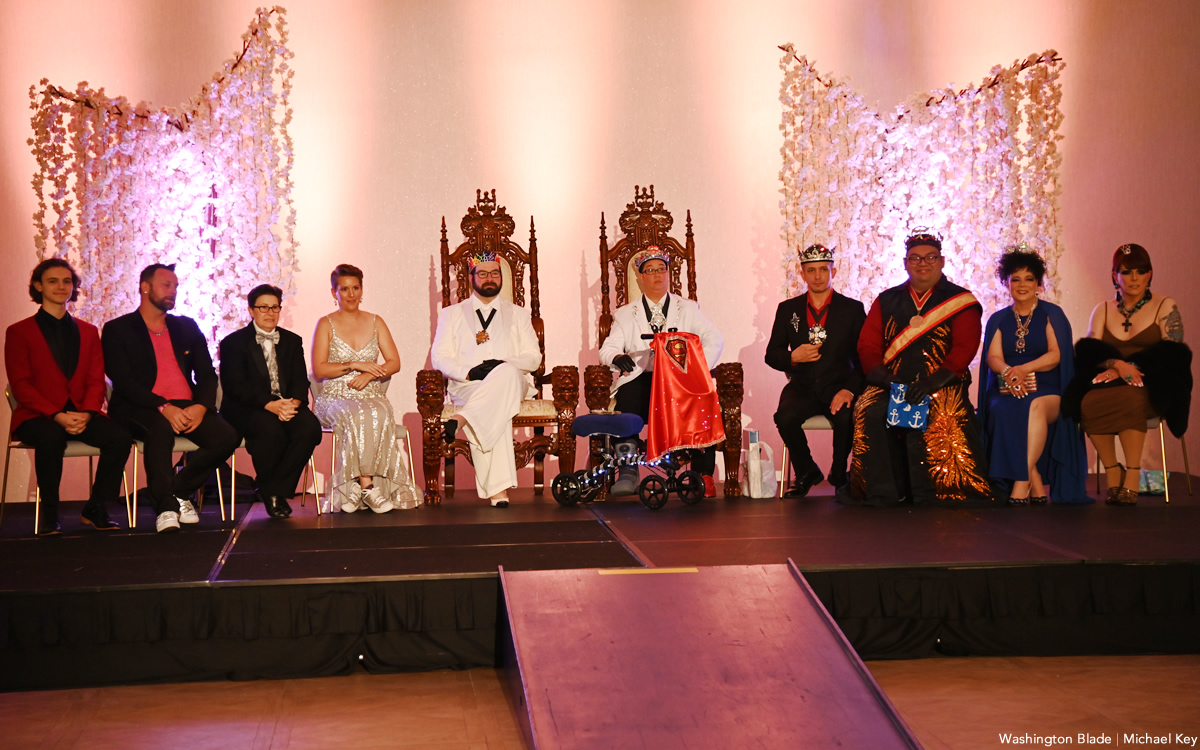
The Imperial Court of Washington, a D.C.-based organization of drag performers that has raised at least $250,000 or more for local LGBTQ and non-LGBTQ charitable groups since its founding in 2010, announced on Jan. 5 that it has ended its operations by dissolving its corporate status.
In a Jan. 5 statement posted on Facebook, Robert Amos, president of the group’s board of directors, said the board voted that day to formally dissolve the organization in accordance with its bylaws.
“This decision was made after careful consideration and was based on several factors, including ongoing challenges in adhering to the bylaws, maintaining compliance with 501(c)(3) requirements, continued lack of member interest and attendance, and a lack of community involvement and support as well,” Amos said in his statement.
He told the Washington Blade in a Jan. 6 telephone interview that the group was no longer in compliance with its bylaws, which require at least six board members, when the number of board members declined to just four. He noted that the lack of compliance with its bylaws also violated the requirements of its IRS status as a nonprofit, tax-exempt 501(c) (3) organization.
According to Amos, the inability to recruit additional board members came at a time when the organization was continuing to encounter a sharp drop in support from the community since the start of the COVID pandemic around 2020 and 2021.
Amos and longtime Imperial Court of Washington member and organizer Richard Legg, who uses the drag name Destiny B. Childs, said in the years since its founding, the group’s drag show fundraising events have often been attended by 150 or more people. They said the events have been held in LGBTQ bars, including Freddie’s Beach Bar in Arlington, as well as in other venues such as theaters and ballrooms.
Among the organizations receiving financial support from Imperial Court of Washington have been SMYAL, PFLAG, Whitman-Walker Health’s Walk to End HIV, Capital Pride Alliance, the DC LGBT Community Center, and the LGBTQ Fallen Heroes Fund. Other groups receiving support included Pets with Disabilities, the Epilepsy Foundation of Washington, and Grandma’s House.
The Imperial Court of Washington’s website, which was still online as of Jan. 6, says the D.C. group has been a proud member of the International Court System, which was founded in San Francisco in 1965 as a drag performance organization that evolved into a charitable fundraising operation with dozens of affiliated “Imperial Court” groups like the one in D.C.
Amos, who uses the drag name Veronica Blake, said he has heard that Imperial Court groups in other cities including Richmond and New York City, have experienced similar drops in support and attendance in the past year or two. He said the D.C. group’s events in the latter part of 2025 attracted 12 or fewer people, a development that has prevented it from sustaining its operations financially.
He said the membership, which helped support it financially through membership dues, has declined in recent years from close to 100 to its current membership of 21.
“There’s a lot of good we have done for the groups we supported, for the charities, and the gay community here,” Amos said. “It is just sad that we’ve had to do this, mainly because of the lack of interest and everything going on in the world and the national scene.”





